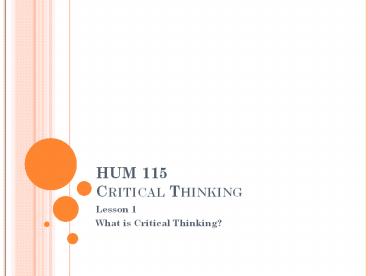Lesson One - PowerPoint PPT Presentation
Title:
Lesson One
Description:
Lesson One – PowerPoint PPT presentation
Number of Views:975
Title: Lesson One
1
HUM 115Critical Thinking
- Lesson 1
- What is Critical Thinking?
2
Introduction
- Critical Thinking
- The art of thinking about thinking while thinking
in order to make thinking better. (Paul/Elder,
pg. xvii)
3
- To be a critical thinker you must be willing to
- Question your own thinking.
- Identify strengths/weaknesses in your thinking.
- Overcome the tendency to be rigid in your
thinking. - Overcome the tendency to validate your own
thinking rather than improve your thinking. - Creatively reconstruct your thinking to make it
better.
4
Lesson 1 What is Critical Thinking?
- Critical Thinking involves
- The desire to actively use the critical question.
- The awareness of a set of interrelated critical
questions. - The ability to ask and answer critical questions
at appropriate times.
5
What is Critical Thinking?
- Critical Thinking (thinking about thinking)
centers on asking the right questions. - If we want the correct information we must learn
to ask the right type of questions. - The right type of question
- Informs us.
- Provides us with direction.
6
What is Critical Thinking?
- How does Critical Thinking benefit us?
- Able to react critically to what we read/hear.
- No longer spectators who just accept what we are
told. - Become involved in what we are learning (active
learners). - What is the goal of Critical Thinking?
- To move the conversation forward.
- Not to get puffed up.
7
Panning for Gold
- The Sponge Model of Thinking
- Absorbing a lot of information (uncritically).
- Advantages
- More knowledge.
- Its easy.
- Downsides
- No way of determining what we should or should
not accept (it is uncritical). - At the mercy of others.
8
Panning for Gold
- Panning for Gold method of thinking (learning).
- Questions the claims of the speaker/author.
- Interacts with the material.
- Goal to critically evaluate the material and
formulate personal conclusions based on their
evaluation of the material.
9
Panning for Gold
- We need to know why someone wants us to
think/believe something. - We should evaluate (judge) what is being said.
- Only after critically examining an argument
should we accept or reject an argument.
10
Panning for Gold
- Gun Laws (pages 4-6).
- Sponge vs. Panning for Gold method.
- Sponge approach what facts might we learn from
this paragraph? - Panning What weaknesses do we find in the
paragraph?
11
Myth of the Right Answer
- There is not always a right answer.
- Therefore you dont have to be an expert on a
topic to use the panning for gold method. - Some topics
- We dont have time to learn all there is to
learn. - We cant know everything.
- Should not cause us to shy away from those topics.
12
Myth of the Right Answer
- Avoid Intellectual arrogance.
- Thinking we know more than we really do.
- Achieve intellectual humility.
- Admit we dont have all the answers.
- Seek out the answers we dont have.
- Through asking the right questions we
- Learn as much as we can about a subject.
- Can make an educated decision about a subject.
13
Myth of the Right Answer
- People will not always agree.
- Not using critical thinking.
- Using critical thinking.
- On some issues, reasonable people will disagree.
14
Myth of the Right Answer
- Even though you will not be able to give a right
answer to every possible question or issue, this
course is designed to provide you with the tools
you will need to develop the best and most
reasonable answer.
15
- We must learn to determine whether or not a
particular issue is worth thinking about. - We must learn to ask, who cares?
- Under what circumstances do you think youll care
enough to devote mental energy to critical
thinking? - When you have a reason (motivation).
- When you have a desire.
16
Weak Sense Vs. Strong Sense
- Critical Thinking can be used in two ways.
- To promote
- Self-centeredness.
- Fair-mindedness.
- Weak Sense Thinking
- Self-centeredness.
- Cares only about defending its own position.
- Fails to consider viewpoints that contradict its
own viewpoint. It lacks fair mindedness. - Weak Sense Thinking, or Sophistry, is the art of
winning arguments regardless of whether there are
problems in the thinking being used and
regardless of whether relevant viewpoints are
being ignored.
17
Weak Sense Vs. Strong Sense
- Sophistic thinkers use lower level reasoning
skills by which they attempt to make unreasonable
thinking look reasonable. - To sum it up
- Weak Sense Thinking (sophistry) is the use of
critical thinking skills to defend your current
beliefs (positions).
18
Weak Sense Vs. Strong Sense
- Strong Sense Critical Thinking
- Is consistent in its pursuit of the fair and just
(fair mindedness). - Strives to analyze and evaluate information.
- Attempts to empathize with others (i.e.strives
to be fair). - Willing to listen to arguments (even those that
are in disagreement). - Willing to change when better reasoning is
presented. - Evaluates all reasonable claims.
- Applies critical questions to all reasonable
claims.
19
Something to Think About
- Do you think that different textbooks on the same
topic would always agree on the right answers?
Why or Why Not? - If there are disagreements, what does that mean
about the way you read your textbooks?
20
Lesson Assignment 1
- Read chapter 2.
- Complete Lesson Assignment 1.
- Weak Sense Thinking vs. Strong Sense Thinking.
- Evaluate debate program.
- If you do not have cable, use talk radio, the
internet, or a newspaper article. - Access assignment on the instructors website.































